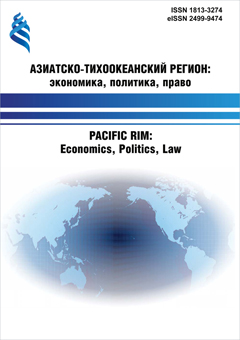Vaccine diplomacy of Russia and China as a marker of cooperation of statesin achieving sustainable development parameters
DOI:
https://doi.org/10.24866/1813-3274/2025-1/92-101Keywords:
vaccine diplomacy, pandemic, concept of sustainable development, soft power, public diplomacyAbstract
The article is aimed at clarifying the phenomenon of vaccine diplomacy between Russia and China as an instrument of “soft power” policy and a form of public diplomacy in the context of achieving sustainable development goals. The relevance of the stated topic is due to the fact that vaccine diplomacy, having experienced an unprecedented rise during the coronavirus pandemic, still remains an insufficiently studied political phenomenon in the system of modern international relations. When writing the article, the author relied on the theoretical and methodological provisions of the concept of “soft power” by J. Naya and the doctrines of public diplomacy in world politics. A statistical method has also been used to analyze the production of anti-coronavirus vaccines and their distribution. Vaccine diplomacy between Russia and China is presented in the general context of the transformation of the modern model of international relations, prompting the leading states of our time to pay significant attention to the problems of sustainable development as a means of forming their. The article substantiates the need to deepen the cooperation between China and Russia in the area of vaccine diplomacy to counter the spread of pharmaceutical products by Western states.
Downloads
References
1. Бобылев С.Н. Устойчивое развитие в интересах будущих поколений: экономические приоритеты // Мир новой экономики. 2017. № 3. С. 90–96.
2. Лебедева М.М. «Мягкая сила»: понятие и подходы // Вестник МГИМО-Университета. 2017. № 3 (54). С. 212–223. DOI: https://doi.org/10.24833/2071-8160-2017-3-54-212-223
3. Маслова К.В. «Мягкая сила» России в Центральной Азии в контексте борьбы с пандемией коронавируса: может ли «вакцинная дипломатия» завоевать «умы и сердца»? // Постсоветские исследования. 2021. Т. 4, № 6. С. 531–536.
4. Соколова Ю.Д. Вакцинная дипломатия как инструмент современных международных отношений (на примере России и стран Восточной Европы) // Панорама. 2021. № 41. С. 37–45.
5. Арсентьева И.И. Трансформация медицинской и вакцинной дипломатии в эпоху Covid-19 // Вестник МГИМО-Университета. 2022. Т. 15, № 5. С. 182–207. DOI: https://doi.org/10.24833/2071-8160-2022-5-86-182-207
6. Рогожина Н.Г. Масочная дипломатия Китая в странах Юго-Восточной Азии // Юго-Восточная Азия: актуальные проблемы развития. 2021. Т. 1, № 1 (50). С. 73–81. DOI: https://doi.org/10.31696/2072-8271-2021-1-1-50-073-081
7. Медовкина Л.Ю., Мнухина Р.М. Роль «вакцинной дипломатии» во внешней политике Китайской Народной Республики // Известия Иркутского государственного университета. Серия: Политология. Религиоведение. 2022. Т. 40. С. 48–55. DOI: https://doi.org/10.26516/2073-3380.2022.40.48
8. Черкашина Т.Н. «Вакцинная дипломатия» как фактор международного ландшафта и её значение для России // Вестник Омского университета. Серия: Исторические науки. 2023. Т. 10, № 3 (39). С. 74–80.
9. Сафронова Е.И. Китайско-латиноамериканские отношения в контексте пандемии Covid-19 // Китай в мировой и региональной политике. История и современность. 2021. Т. 26, № 26. С. 179–199.
10. Инь С. Российско-китайские двусторонние отношения на фоне перехода от стратегии «Поворот на Восток» к концепции «Большая Евразия» // Общество: политика, экономика, право. 2023. № 5 (118). С. 32–37.
Downloads
Published
Issue
Section
License
Copyright (c) 2025 Алёна Дмитриевна Наливкина

This work is licensed under a Creative Commons Attribution-NonCommercial-NoDerivatives 4.0 International License.


